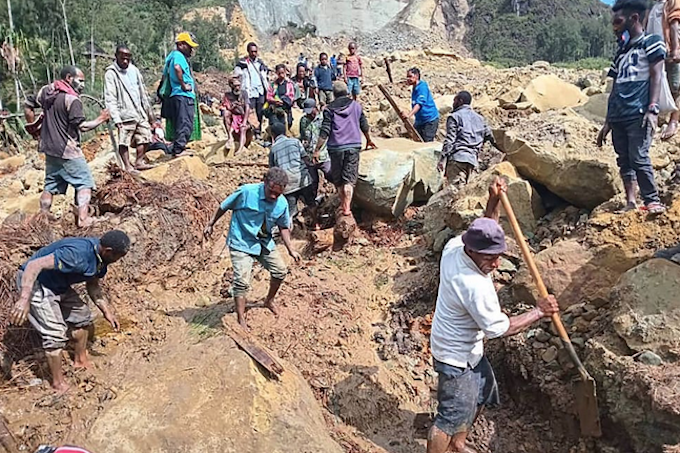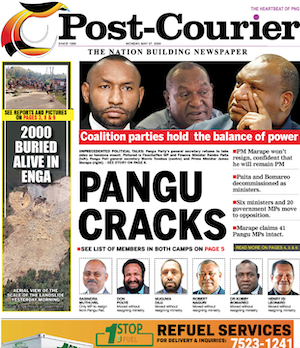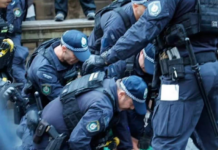
By Eleisha Foon,
More than 2000 people were buried alive in the huge landslide which hit Papua New Guinea on Friday, the National Disaster Centre has now confirmed.
An entire community living at the foot of a mountain in the remote Enga Province were buried in their sleep about 3am.
Earlier reports suggested 670 people died and 150 homes flattened.
- READ MORE: PNG landslide: Couple pulled alive from rubble as 690 feared dead
- PNG landslide: Survivors of highlands disaster desperately seeking help
- Hundreds feared dead after huge landslide in Papua New Guinea
- Local officials fear fate of 300 missing people in remote PNG landslide
- Other Engan landslide reports
It is the largest landslide since the 7.5 magnitude earthquake hit Hela Province in 2018.
Yambali villagers are using their bare hands to dig out the buried bodies of family members while they wait for more help to arrive.
So far only three people have survived the catastrophic landslide, and only four bodies have been recovered.
The Provincial Emergency Response Team is working with the United Nations on the ground, while the rest of the victims lay under boulders and six to eight metres of dirt and debris.
Excavator donated
A local businessman donated an excavator which has been used to dig up bodies but wet conditions and moving terrain has meant engineers have had limited access to the site.
Community leader Miok Michael has visited the site and said it was heartbreaking.
“People are still crying for help as hundreds, if not thousands of bodies are still scattered.”
RNZ Pacific correspondent Scott Waide said that “many people have accepted their loved ones are dead. But in PNG there needs to be closure so a lot of people will want to dig up the bodies for closure”.
Police station commander Martin Kelei said the situation was slow-moving.
“It is not gravel you can easily remove. They are under very big boulders of rock.”
The government has set aside 500,000 kina (NZ$210,000) for relief aid.
The Disaster Management Team have assessed the damage.
Joint statement
A joint statement has been provided following the assessment official of damage on behalf of acting director Lusete Laso Mana along with Defence Minister Dr Billy Joseph, Defence Secretary Hari John Akipe, Government Chief Secretary Ivan Pomaleu and Defence Force Chief commodore Philip Polewara.
“The disaster committee determined that the damages are extensive and require immediate and collaborative actions from all players including DMT, PNGDF, NDC and Enga PDC to effectively contain the situation.
“The landslide buried more than 2000 people alive and caused major destruction to buildings, food gardens and caused major impact on the economic lifeline of the country.”
The number of residents in the village is much higher than previously thought.
CARE PNG country director Justine McMahon said 2022 data estimated 4000 people lived in the area, not including children or people who flocked there after being displaced by tribal violence.
Many challenges remain including removing boulders that block the main highway to Porgera Mine.
The situation remains unstable as the landslip continues to shift slowly, posing ongoing danger to rescue teams and survivors.
Tribal fighting
There is also tribal fighting in the area, something which Enga province is notorious for.
UN International Organisation for Migration representative Sehran Aktoprak said that as the death toll mounted, 250 homes nearby had been evacuated.

He was also concerned over tribal fighting that had “flared up between two clans halfway between the capital of the province Wabag and the disaster site”.
He said about eight people had been killed, and five businesses, shops and 30 houses had been burnt down as a result.
Aktoprak said the IOM humanitarian convoy witnessed “many houses still burning” on the way through to the Yambali disaster site.
“Women and children seem to be displaced. Whereas men and youth in the area seem to be carrying bush knives, standing on alert. It is such a dangerous place. The convoy can’t stop to observe their needs. The only way the transport corridor can remain open is thanks to security escorts.”
Tough conditions
World Vision PNG representative Chris Jensen said rainfall and tough conditions on the ground may cause aid delays.
“There’s a huge amount of challenges in getting to such a remote location,” he said.
“we also have continuing landslides that do create a problem as well as the tribal fighting so this does inhibit our ability in the international community to move quickly but we’re doing all we can and help will be there as soon as possible.”
Although the call for help from international partners has been made, the political focus has now shifted from the disaster in Enga province to the capital Port Moresby, for a vote of no confidence against the nation’s Prime Minister James Marape.
New Zealand and Australian governments are on standby to help.









































